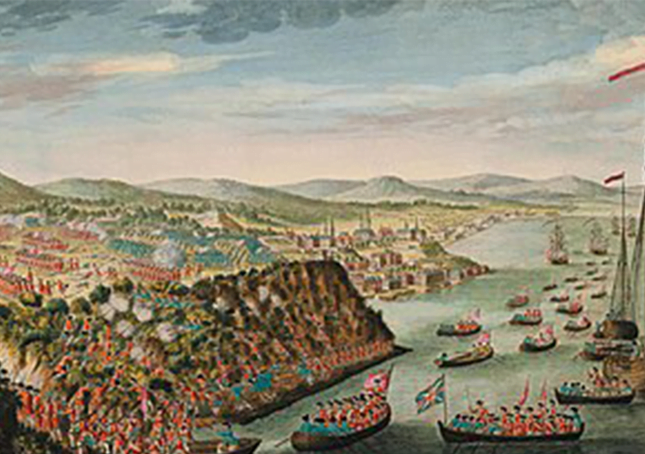Quebec City

Quebec City (/kwɪˈbɛk/ (About this soundlisten) or /kəˈbɛk/;[10] French: Ville de Québec, officially Québec ([kebɛk] (About this soundlisten))) is the capital city of the Canadian province of Quebec. As of July 2016 the city had a population of 531,902, and the metropolitan area had a population of 800,296.[13] It is the eleventh-largest city and the seventh-largest metropolitan area in Canada. It is also the second-largest city in the province after Montreal.
The Algonquian people had originally named the area Kébec, an Algonquin[note 1] word meaning “where the river narrows”, because the Saint Lawrence River narrows proximate to the promontory of Quebec and its Cape Diamant.
Explorer Samuel de Champlain founded a French settlement here in 1608, and adopted the Algonquin name. Quebec City is one of the oldest European cities in North America. The ramparts surrounding Old Quebec (Vieux-Québec) are the only fortified city walls remaining in the Americas north of Mexico. This area was declared a World Heritage Site by UNESCO in 1985 as the “Historic District of Old Québec”.
The city’s landmarks include the Château Frontenac hotel that dominates the skyline and the Citadelle of Quebec, an intact fortress that forms the centrepiece of the ramparts surrounding the old city and includes a secondary royal residence.
The National Assembly of Quebec (provincial legislature), the Musée national des beaux-arts du Québec (National Museum of Fine Arts of Quebec), and the Musée de la civilisation (Museum of Civilization) are found within or near Vieux-Québec.
According to the Government of Canada, the Government of Quebec, and the Geographical Names Board of Canada, the names of Canadian cities and towns have only one official form. Thus, Québec is officially spelled with an accented é in both Canadian English and French.
In English, the city and the province are officially distinguished by the fact that the province does not have an accented é and the city does. Informally, however, the accent is usually omitted in common usage, so the unofficial form “Quebec City” is used to distinguish the city from the province.
In French, the names of provinces are gendered nouns and the names of cities are not, so the city and the province are already distinguished by the presence or absence of a definite article in front of the name. For example, the concept of “in Quebec” is expressed as “à Québec” for the city and “au Québec” for the province.
